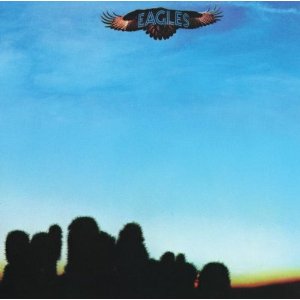
Eagles (1972)

1. Take it Easy
2. Witchy Woman
3. Chug All Night
4. Most of us are Sad
5. Nightingale
6. Train Leaves Here This Morning
7. Take the Devil
8. Earlybird
9. Peaceful Easy Feeling
10.Tryin'
It is a peculiar footnote in rock history that one of America’s quintessential “California bands” began life with no Californians in the lineup. The Eagles — that enduring symbol of golden coast cool and laconic “country rock” — were, in fact, a coalition of geographical outliers. Don Henley, a Texan. Glenn Frey, a product of Detroit. Bernie Leadon, from Florida. And Randy Meisner, a Nebraskan who drifted through Poco and Rick Nelson’s Stone Canyon Band before landing in Los Angeles. All four converged in the early ’70s, backed Linda Ronstadt for a time, and then — as such stories go — struck out on their own. The result: an American institution.
Their debut album, simply titled Eagles, was a quietly revolutionary piece of work. Though overshadowed by their later megastardom, this first outing stands as one of their most complete, most cohesive, and perhaps most honest. No egos yet, no artistic schisms, no cocaine-fueled stage brawls — just four hungry musicians leaning into a democratic balance that would soon vanish. Every member sings lead at least once, and every voice contributes to that silken, unmistakable harmony blend that would become their calling card.
The term “country rock,” often lazily affixed to this album, does some disservice to the range of its content. Yes, Take It Easy and Peaceful Easy Feeling wear the genre’s trappings proudly — steel guitar twangs, amiable shuffles, and lyrics that sound as though they were written on the back of a postcard sent from Winslow, Arizona. But that’s only half the story. Witchy Woman, arguably the album’s standout, is a dark, sinuous number driven by tribal percussion and a melody that owes more to the desert than the ranch. It was Henley’s only lead vocal on the album, but it revealed a voice perfectly suited for the band’s more haunted, introspective work — something later albums would come to rely on.
And then there are the quieter triumphs. Most of Us Are Sad, sung by Meisner, is tender and woefully underappreciated — a ballad that wears its heart unashamedly on its sleeve, with harmonies that shimmer like mirage. Leadon’s Train Leaves Here This Morning is another high point — its acoustic austerity foreshadowing the more introspective terrain the band would tread before they traded roots for radio dominance. If it is not more celebrated, it may be due to Leadon’s eventual quiet exit from the band — the first, but not the last, of many casualties to come.
Even the misfires are interesting. Earlybird, for instance, begins with literal bird calls and has a kind of goofy rustic charm — though it’s perhaps best described as a “period piece.” But the song still manages to redeem itself with those omnipresent vocal harmonies that paper over nearly any misjudgment. That was the Eagles’ gift from the beginning: even their mistakes sounded better than most bands’ triumphs.
It is tempting, in retrospect, to see Eagles as a blueprint that was soon abandoned. The album is lean, modest, and free from the corporate gloss that would eventually turn them into icons and irritants in equal measure. Later efforts like Hotel California were more ambitious, more polished, and certainly more commercially potent — but rarely more sincere.
For listeners who arrived late, drawn by the bombast and baroque drama of the band’s later years, this debut may feel disarmingly intimate. That’s precisely its charm. It wasn’t built for arenas — it was built for front porches, FM radio, and late-night drives on desert highways. And for that reason alone, it may be the purest thing they ever did.
Go back to the main page
Go To Next Review